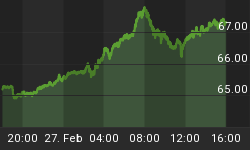Below is an extract from a commentary originally posted at www.speculative-investor.com on 29th August 2006.
If you spend (waste) a lot of time reading or listening to the explanations in the mainstream financial press for why the gold market did what it did on a particular day you will probably come away with the impression that the oil market drives the gold market. For example, whenever gold and oil prices fall on the same day you'll almost certainly see headlines such as "gold follows oil lower"; and whenever both markets rise together there will usually be headlines such as "gold bounces in response to higher oil price".
The idea that the oil price is an important driver of the gold price has also been given weight by the commentaries of the many gold bugs who, over recent years, have often cited the rising oil price as a reason to expect a higher gold price. Some gold bugs even claim, in one breath, that a higher oil price is bullish for gold and then, in the next breath, that gold is money. It seems not to have occurred to them that there's no reason for the demand for money and the demand for industrial commodities to move in the same direction.
On a side note, gold is unfortunately not money right now, but in many respects it still trades as if it were. For example, it typically turns in its best performances when real economic growth and confidence are falling.
When a particular viewpoint becomes entrenched it will often be self-fulfilling in the short-term. For instance, the idea that the widening US trade deficit all but guaranteed a continuing decline in the dollar gripped the markets during the final quarter of 2004 and encouraged a lot of speculative 'shorting' of the dollar. Even though it was based on a false premise this speculative 'shorting' had the effect of pushing the dollar down at the same time as interest rate differentials were setting the scene for a US$ recovery. In a similar way, the mistaken view that the oil market is an important driver of the gold market is causing a stronger correlation between the two markets than there should be, which, in turn, reinforces the faulty analysis.
But just as the "dollar is going to plunge due to the widening trade deficit" idea that was so popular at the end of 2004 was eventually overwhelmed by real interest rate differentials (the true fundamental drivers of intermediate-term exchange-rate trends), we suspect that the "oil price drives the gold price" idea that is currently quite popular will, before much longer, be overwhelmed by genuine fundamentals.
In our opinion, changes in the oil price are neither here nor there as far as the price of gold bullion is concerned. Under the current monetary system the directions of the long-term price trends in oil and gold will tend to be the same because inflation is a primary driver of both markets, but it is what's happening on the monetary front, not what's happening with oil supply/demand, that matters to the gold market.
Changes in the oil price do, however, have an important effect on gold mining shares, but it's not the effect that most people would expect. To be specific, as far as gold mining equities are concerned a rise in the oil price is BEARISH and a fall in the oil price is BULLISH. The reason, of course, is that gold miners are major CONSUMERS of oil (a large chunk of a gold miner's costs are energy-related).
In theory, therefore, a comparison of longer-term charts of oil and the AMEX Gold BUGS Index (HUI) should reveal a slight inverse correlation. Fortunately, this is what the following chart comparison of the oil price and the HUI actually does reveal (we say "fortunately" because it's nice when market trends make sense). In particular, the chart shows that:
a) The start of the long-term bull market in gold shares in Q4-2000 coincided, almost to the day, with an intermediate-term PEAK in the oil price
b) The largest percentage gains made by gold shares occurred between Q4-2000 and Q4-2003, a period during which the oil price was basing
c) Oil's upside breakout from its base coincided with the start of a major downward correction in the gold shares
d) Between November of last year and May of this year the oil price and the HUI both surged upward. In light of what happened over the preceding 7 years this action was anomalous, although it simply reflected the fact that the gold price was rising at a faster rate than the oil price during this period (gold was strong enough relative to oil to offset the adverse effects, on the profit margins of gold miners, of higher energy prices)
Of interest, but not shown on the below chart, is the fact that ALL the gains in the major gold shares relative to the gold price were made while the oil price was below $35.

In summary, the oil price does not drive the gold price and the only reason the two markets have similar long-term trends is that they have one important long-term driver in common: monetary inflation. There is, however, an inverse relationship between the oil price and the prices of gold shares, but this relationship only comes to the fore during periods when the oil price is moving sharply lower or sharply higher relative to the gold price.















